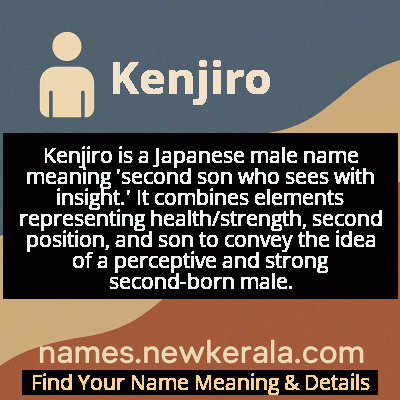Kenjiro Name Meaning & Details
Origin, Popularity, Numerology Analysis & Name Meaning of Kenjiro
Discover the origin, meaning, and cultural significance of the name KENJIRO. Delve into its historical roots and explore the lasting impact it has had on communities and traditions.
Name
Kenjiro
Gender
Male
Origin
Japanese
Lucky Number
1
Meaning of the Name - Kenjiro
Kenjiro is a Japanese male name meaning 'second son who sees with insight.' It combines elements representing health/strength, second position, and son to convey the idea of a perceptive and strong second-born male.
Kenjiro - Complete Numerology Analysis
Your Numerology Number
Based on Pythagorean Numerology System
Ruling Planet
Sun
Positive Nature
Leaders, ambitious, highly driven, self-reliant, innovative.
Negative Traits
Overly aggressive, domineering, impatient, selfish.
Lucky Colours
Red, orange, gold.
Lucky Days
Sunday.
Lucky Stones
Ruby, garnet.
Harmony Numbers
2, 3, 9.
Best Suited Professions
Entrepreneurs, managers, engineers.
What People Like About You
Courage, determination, leadership.
Famous People Named Kenjiro
Kenjiro Takayanagi
Engineer
Pioneer of Japanese television technology, known as the 'Father of Japanese TV'
Kenjiro Yamashina
Ornithologist
Renowned Japanese ornithologist and founder of the Yamashina Institute for Ornithology
Kenjiro Shoda
Mathematician
Influential Japanese mathematician who founded the Osaka School of Mathematics
Kenjiro Den
Actor
Japanese actor known for roles in 'The Last Samurai' and various Japanese television dramas
Name Variations & International Equivalents
Click on blue names to explore their detailed meanings. Gray names with will be available soon.
Cultural & Historical Significance
The name embodies the Japanese cultural values of strength, family hierarchy, and the expectation that second sons would develop keen observational skills to support the family structure without the primary inheritance responsibilities of the firstborn. In traditional Japanese families, second sons often played crucial supporting roles, requiring them to be perceptive and adaptable. This historical context gives the name Kenjiro deep cultural resonance, representing not just birth order but the valued qualities expected of a second son - insight, supportiveness, and strategic thinking that complements rather than challenges the primary heir's position.
Extended Personality Analysis
Individuals named Kenjiro are often perceived as observant, analytical, and possessing deep insight into situations and people. They tend to be the 'quiet watchers' in social settings, absorbing information and understanding underlying dynamics that others might miss. This perceptive nature makes them excellent problem-solvers and trusted advisors. Their position as 'second son' in the name's meaning often translates to a personality that is supportive rather than dominant, collaborative rather than commanding.
Kenjiros typically exhibit patience, careful consideration before acting, and a methodical approach to challenges. While they may not seek the spotlight, their insights and observations often prove invaluable in both personal and professional contexts. Many Kenjiros develop strong intuitive abilities and are known for their ability to see multiple perspectives in complex situations. They often serve as mediators or counselors within their social and professional circles, using their natural inclination toward observation to help resolve conflicts and guide decisions. The combination of strength (from the 'ken' character) and supportive positioning creates a personality that is both resilient and empathetic, capable of standing firm when necessary while maintaining the flexibility to adapt to changing circumstances.
Modern Usage & Popularity
In contemporary Japan, Kenjiro maintains its traditional appeal while adapting to modern naming trends. The name has seen consistent but moderate usage over the past century, never reaching the popularity peaks of trendier names but maintaining steady presence. It's particularly favored by families valuing tradition and cultural heritage. In recent decades, the name has become somewhat less common as Japanese parents increasingly opt for more modern or international-sounding names. However, it remains a respected choice that conveys strength, tradition, and intelligence. The name is occasionally used in Japanese diaspora communities abroad, though often shortened to 'Kenji' or 'Ken' for ease of pronunciation in non-Japanese speaking environments. Despite some decline in usage, Kenjiro continues to be chosen by parents who appreciate its deep cultural roots and the positive characteristics it represents.
Symbolic & Spiritual Meanings
Kenjiro symbolizes the wisdom that comes from observation and the strength found in supportive roles. The name carries metaphorical significance as representing the 'eyes of the family' - the one who sees clearly when others might be blinded by emotion or tradition. It embodies the concept of 'second position' not as inferiority but as strategic advantage, allowing for clearer perspective without the burdens of primary leadership. The combination of characters suggests a person who builds health and strength through careful progression as a complete individual. Symbolically, Kenjiro represents the bridge between tradition and perception, carrying forward family legacy while maintaining clear vision for the future. The name suggests someone who understands that true strength often lies in knowing when to observe and when to act, making them invaluable in both preserving what works and recognizing what needs to change.

